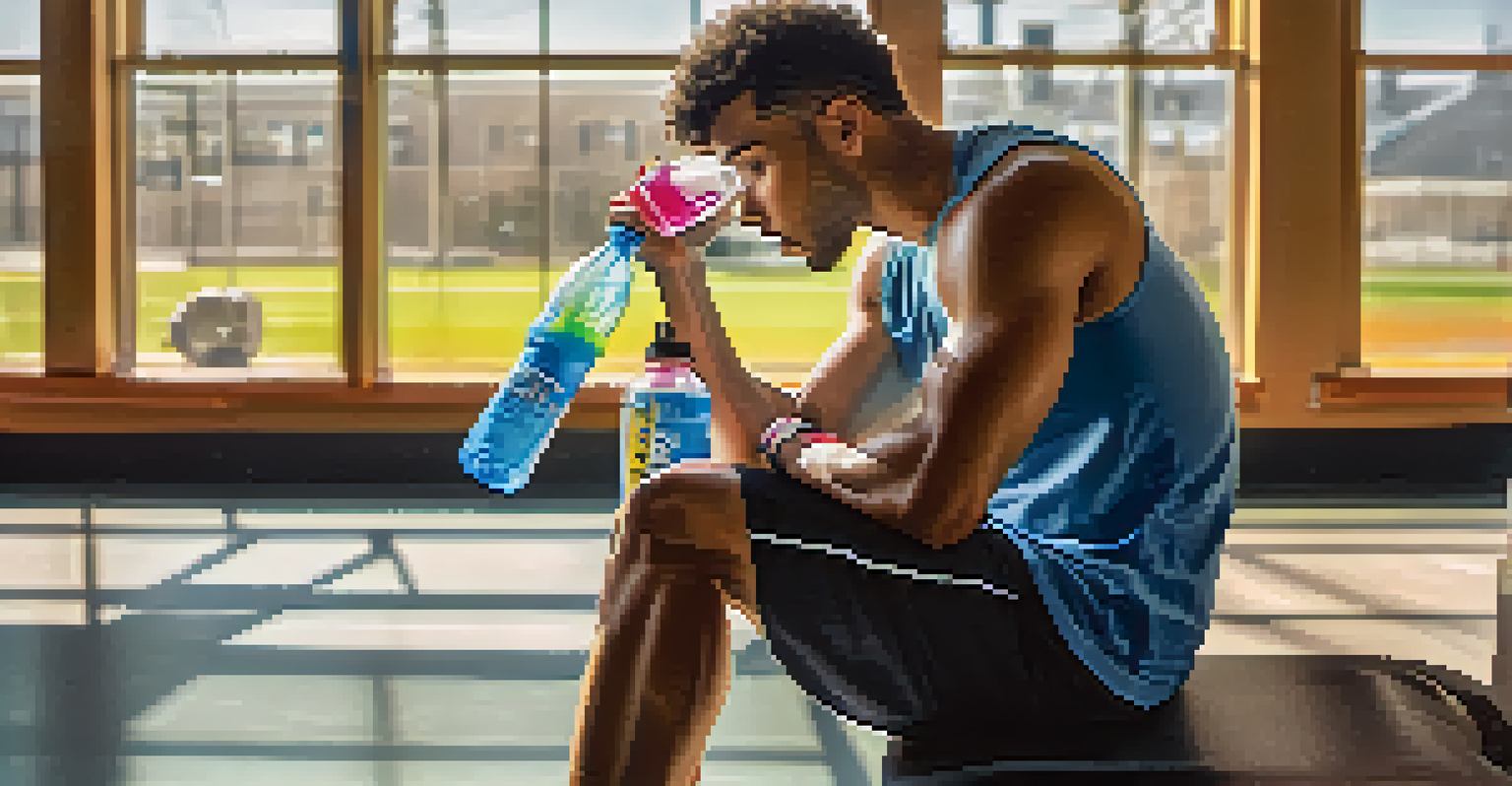The Science Behind Hydration and Muscle Recovery Explained

What Happens During Exercise and Why Hydration Matters
When you exercise, your body loses water through sweat and respiration, which is essential for cooling down. This loss can lead to dehydration, affecting your performance and muscle recovery. Staying hydrated helps maintain optimal body temperature and supports cardiovascular function.
Water is the source of life, and without it, we cannot thrive, especially in our physical pursuits.
Dehydration can cause fatigue, dizziness, and muscle cramps, which can hinder your workout and delay recovery. For instance, even a loss of just 2% of your body weight in water can impair athletic performance significantly. This is why understanding hydration is crucial for anyone engaged in physical activity.
Additionally, hydration supports the transport of nutrients and oxygen to your muscles. When you’re well-hydrated, your blood volume increases, allowing for better circulation and efficient nutrient delivery, which is vital for muscle repair post-exercise.
The Role of Electrolytes in Maintaining Hydration
Electrolytes, such as sodium, potassium, and magnesium, play a significant role in hydration. They help regulate fluid balance in your body and are lost through sweat during exercise. Replenishing these electrolytes is essential, especially after intense workouts.

For example, consuming sports drinks or electrolyte-rich foods can help restore the balance of these minerals. This not only aids in rehydration but also helps prevent muscle cramps and fatigue, allowing for more effective recovery.
Hydration Boosts Performance
Staying hydrated enhances athletic performance and aids in muscle recovery by maintaining optimal body temperature and nutrient delivery.
Understanding the importance of electrolytes goes hand in hand with hydration. Together, they contribute to optimal muscle function and recovery, ensuring you're ready for your next workout.
How Hydration Affects Muscle Recovery Post-Workout
After a workout, your muscles need time to repair and grow stronger. Hydration plays a crucial role in this recovery process. When you drink enough fluids, it helps flush out toxins and supports the delivery of nutrients necessary for muscle repair.
The human body is 60% water, and without adequate hydration, it simply cannot function at its best.
For instance, protein synthesis, the process through which your body repairs and builds muscle tissue, is significantly enhanced when you’re hydrated. Without adequate hydration, this process can be slowed down, leading to longer recovery times.
Moreover, staying hydrated helps reduce muscle soreness after exercise. This means that not only will you recover faster, but you’ll also be ready to hit the gym again sooner, keeping your fitness goals on track.
Signs of Dehydration to Watch Out For
Recognizing the signs of dehydration is crucial for athletes and fitness enthusiasts. Common indicators include thirst, dry mouth, dark yellow urine, and fatigue. Ignoring these signs can lead to more serious issues, including heat exhaustion.
During exercise, pay attention to how your body feels. If you start to feel overly fatigued, dizzy, or experience muscle cramps, it might be time to rehydrate. Remember, prevention is always better than cure, so staying ahead of dehydration is key.
Electrolytes are Essential
Replenishing electrolytes lost through sweat is crucial for preventing fatigue and muscle cramps, especially after intense workouts.
Being proactive in monitoring your hydration levels can significantly impact your performance and recovery. A good rule of thumb is to drink water before, during, and after your workout, ensuring your body stays fueled and ready for action.
Hydration Strategies for Effective Muscle Recovery
Implementing effective hydration strategies can enhance your muscle recovery. Start by establishing a routine that includes drinking water consistently throughout the day, not just during workouts. This helps maintain your hydration levels.
Consider incorporating electrolyte drinks or coconut water post-exercise, especially after intense sessions. These beverages can help replenish lost minerals and improve recovery time. Additionally, pairing hydration with a balanced meal can further support muscle repair.
Tracking your fluid intake can also be beneficial. There are various apps and tools available that can help you stay on top of your hydration goals, ensuring you’re always prepared for your next workout.
The Connection Between Hydration and Overall Health
Hydration is not just crucial for athletes; it’s important for everyone’s overall health. Proper hydration aids in digestion, skin health, and even cognitive function. It’s easy to overlook, but drinking enough water can make a significant difference in your everyday life.
For example, staying hydrated can improve your mood and energy levels, making daily activities more manageable. When you're well-hydrated, your body functions more efficiently, allowing for better concentration and productivity.
Signs of Dehydration to Watch
Being aware of dehydration signs, such as thirst and fatigue, can help you take proactive measures to maintain your hydration levels.
Thus, prioritizing hydration is a simple yet effective way to enhance both physical performance and overall well-being. Remember, your body is largely made up of water, so keeping it hydrated is vital for your health.
Conclusion: Make Hydration a Priority in Your Routine
In summary, hydration plays a pivotal role in muscle recovery and overall health. By understanding the importance of staying hydrated, you can maximize your performance and recovery, ensuring that you stay on track with your fitness goals.
Incorporating hydration strategies into your routine doesn’t have to be complicated. Simple habits like carrying a water bottle or setting reminders to drink can make a big difference. Remember, every sip counts!

Ultimately, prioritizing hydration is an investment in your health and fitness journey. So, the next time you hit the gym or go for a run, remember to keep that water bottle handy and drink up for optimal performance and recovery.